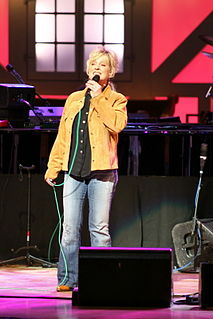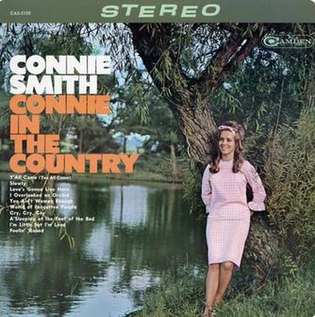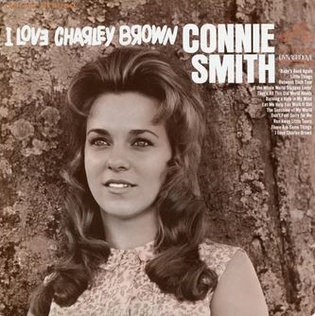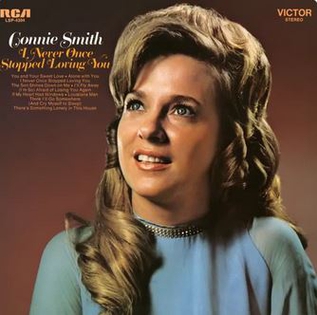Related Research Articles

Connie Smith is an American country music singer and songwriter. Her contralto vocals have been described by music writers as significant and influential to the women of country music. A similarity has been noted between her vocal style and the stylings of country vocalist Patsy Cline. Other performers have cited Smith as influence on their own singing styles, which has been reflected in quotes and interviews over the years.

"Once a Day" is a song written by Bill Anderson and recorded as the debut single by American country artist Connie Smith. It was produced by Bob Ferguson for her self-titled debut album. The song was released in August 1964, topping the Billboard country music chart for eight weeks between late 1964 and early 1965. It was the first debut single by a female artist to reach number one on the Billboard Hot Country Songs. This song peaked at number one for the week of November 28, 1964, and it stayed at number one for eight consecutive weeks, a record for a female solo artist for nearly 50 years, until it was surpassed by Taylor Swift's "We Are Never Ever Getting Back Together" in December 2012.
"Seattle" is a song composed by Hugo Montenegro with lyrics by Jack Keller and Ernie Sheldon. It was used as the theme for the 1968–1970 ABC-TV United States television show Here Come the Brides, which was set in 19th-century Seattle, Washington.

Connie Smith is the debut studio album by American country music artist Connie Smith. It was released in March 1965 on RCA Victor Records and was produced by Bob Ferguson. The album included Smith's debut single, "Once a Day". The song became her signature recording and biggest hit, reaching number one on the Billboard country songs chart.

Connie in the Country is a studio album by American country singer Connie Smith. It was released in February 1967 via the RCA Camden label and contained ten of tracks of material. It was the seventh studio disc released in Smith's career and her first released on RCA's budget Camden label. Unlike other RCA Camden albums, the project consisted of new recordings for Smith's catalog. This included the single, "Cry, Cry, Cry", which was a top 20 hit on the American country songs chart in 1968.

I Love Charley Brown is a studio album by American country singer Connie Smith. It was released in April 1968 via RCA Victor and featured 12 tracks. It was the tenth studio disc issued in Smith's career and reached the top 20 of the American country albums chart. The album was described as a collection of pop-inspired country songs. Included were four cuts written by Smith's longtime songwriting collaborator, Dallas Frazier. Among his cuts was one of the album's three singles, "Run Away Little Tears". Along with Frazier's cut, the two additional singles included reached the top ten of the American country songs chart. The album was met with favorable reviews from critics.

Connie's Country is a studio album by American country singer Connie Smith. It was released in April 1969 via RCA Victor and contained 12 tracks. The pop-inspired project included a mixture of original and cover songs. The album's cover of Gordon Lightfoot's "Ribbon of Darkness" was released as a single, reaching the top 20 of the American country songs chart. The album itself would place in the top 20 of the American country albums chart. It was met with favorable reviews following its release.

The Best of Connie Smith Volume II is a compilation album by American country singer Connie Smith. It was released in March 1970 via RCA Victor and contained ten tracks. It was the second "Best Of" compilation released by the RCA Victor label that featured Smith's musical output. The disc compiled Smith's most popular singles between 1967 and 1969. The album reached the top 30 of the American country albums chart following its release. Also included was two new recordings. Of these new recordings, one was released as a single in 1969. Titled "You and Your Sweet Love", it reached the top ten of the country singles chart.

I Never Once Stopped Loving You is a studio album by American country singer Connie Smith. It was released in September 1970 on RCA Victor and contained ten tracks. It was the sixteenth studio album of Smith's career and was considered a traditional country project. The collection mixed original material with covers of previously-recorded songs. Three singles were included on the album: "You and Your Sweet Love", the title track and "Louisiana Man". Both "You and Your Sweet Love" and the title track reached the top ten on the American country songs chart in 1970. The album itself charted in the top 20 of the American country LP's survey. Billboard magazine gave the LP a positive response following its original release.

Where Is My Castle is a studio album by American country singer Connie Smith. It was released in January 1971 via RCA Victor and contained ten tracks. The album was described as a set of a traditional country songs and were considered to be autobiographical of Smith's life at the time. The disc's title track was released as a single in 1970 and reached the top 20 of the North American country charts. The album itself would chart in the top 40 of the American country LP's chart. Following its release, Billboard magazine gave it a positive review.

Just One Time is a studio album by American country singer Connie Smith. It was released in June 1971 via RCA Victor and contained ten tracks. It was Smith's eighteenth studio album released in her career and her second of 1971. The album was named for the lead single of the same name, which reached the top five of the North American country charts in 1971. The album itself would chart in the top 20 of the American country LP's chart following its release. Additionally, Billboard magazine gave the project a positive reception when reviewing it in 1971.

Love Is the Look You're Looking for is a compilation album by American country singer Connie Smith. It was released in February 1973 via RCA Victor and contained ten tracks. It was Smith's third compilation released by the RCA Victor label and mostly included previously-recorded material. The album was issued following Smith's exit from RCA's roster. It was named for its title track, which became a top ten single on the North American country singles charts. The album itself would chart on the American country LP's chart in 1973.
"If I Talk to Him" is a song written by Dolores Edgin and Priscilla Mitchell, and released as a single by American country artist Connie Smith. It was produced by Bob Ferguson and released on her 1966 studio album Miss Smith Goes to Nashville. The song was released in August 1965 and reached the Top 5 on the Billboard Magazine country music chart, becoming her fourth Top 10 single. The song was recorded under RCA Victor Records.
"Nobody But a Fool " is a song written by Bill Anderson and released as a single by American country artist Connie Smith. It was the second single spawned from her 1966 album Miss Smith Goes to Nashville and was produced by Bob Ferguson. The single was released in January 1966 by RCA Victor and peaked within the Top 5 on the Billboard Magazine country music singles chart, becoming her fifth Top 10 hit in a row.

The albums discography of Connie Smith, an American country artist, consists of 37 studio albums, one live album, 14 compilation albums, three box sets, and 26 other appearances. After the success of her 1964 single "Once a Day", Smith's self-titled debut album was released in March 1965 on RCA Victor Records. The album reached number one on the Billboard Top Country Albums, spending thirty weeks on the chart, while also becoming her only album to reach the Billboard 200 list (#105). Smith's next two secular albums, Cute 'n' Country and Miss Smith Goes to Nashville went to number one and number two respectively between 1965 and 1966. In September 1966 Smith released her fifth studio album, Born to Sing, which was her third album to reach the top spot on the Billboard country albums chart. Due to Smith's popularity, RCA Victor issued five albums between 1967 and 1968 including Downtown Country (1967), Connie Smith Sings Bill Anderson (1967), and I Love Charley Brown (1968). In 1969, Smith collaborated with country artist Nat Stuckey on the album Young Love.

The singles discography of Connie Smith, an American country artist, consists of 47 singles, one music video and one additional charting song. After signing with RCA Victor Records in 1964, Smith released her debut single in August entitled "Once a Day". The song topped the Billboard Magazine Hot Country Singles chart by November and held the position for eight weeks, to date being the longest running song at number one by a female country artist. The single's success launched Smith into stardom, making Smith one of the decade's most successful female artists. The follow-up single "Then and Only Then" reached #4 on the country singles chart, while its flip side went to #25 on the same chart. All of Smith's singles released between 1965 and 1968 reached the top 10 on the Billboard country songs chart, including "If I Talk to Him", "Ain't Had No Lovin'", and "Cincinnati, Ohio". By 1969 Smith felt highly pressured from her career and cut back on promoting singles. Smith's chart success slightly declined because of this, with songs like "Ribbon of Darkness" (1969) and "Louisiana Man" (1970) only reaching the top 20. Other singles continued to peak within the top 10 including "I Never Once Stopped Loving You" (1970) and "Just One Time" (1971).
"Louisiana Man" is a song originally written and recorded by American country artist Doug Kershaw in 1961. It peaked at #10 that year on the Billboard Hot Country Singles chart when Kershaw and his brother released it as Rusty and Doug.

"A Far Cry from You" is a song written by Steve Earle that was released as a single by American country artist Connie Smith. The song was released as a single on Epic Records and did not appear on an official album. "A Far Cry from You" became Smith's first official single to be issued following her decision to enter semi-retirement in the late 1970s. Secondly, the song became her final single to reach a position on the Billboard country chart.
"Burning Bridges" is a song written by Walter Scott and performed by Jack Scott. It reached No. 3 on the Billboard Hot 100, No. 5 on the U.S. R&B chart, and No. 32 on the UK Singles Chart in 1960. It was featured on his 1960 album What in the World's Come Over You.

The Cry of the Heart is a studio album by American country music singer Connie Smith. It was released on August 20, 2021, via Fat Possum Records. It is Smith's 54th studio album in her career and the third to be produced by her husband, Marty Stuart. The album is also Smith's first studio album in a decade. It comprises a total of 11 tracks, three of which were penned by Smith and Stuart. the album features recordings penned by Merle Haggard, Melba Montgomery and Carl Jackson. Three tracks are covers of songs previously released as singles by country artists. The album received positive reception from critics and journalists following its release.
References
- ↑ "classic-country-song-lyrics.com". classic-country-song-lyrics.com. Retrieved May 26, 2021.
- ↑ Whitburn, Joel (2004). The Billboard Book Of Top 40 Country Hits: 1944-2006, Second edition. Record Research. pp. 387–88.